Taxation Law Case Study: Spriggs v Federal Commissioner of Taxation
VerifiedAdded on 2023/05/31
|12
|1027
|463
Case Study
AI Summary
This case study analyzes the Spriggs v Federal Commissioner of Taxation [2007] case, focusing on the deductibility of management fees claimed by AFL players under section 8-1(a) of the ITAA 1997. The central issues revolve around whether the management fees and other expenses incurred in generating assessable income were deductible, whether the expenses were incidental to revenue generation, and if the expenses were capital in nature. The court determined that the management fees were deductible as they were incurred in the course of generating taxable income from the players' sporting activities and related commercial ventures. The court found that the players' contracts were employment contracts but also allowed for earnings from non-playing activities, and that the management fees were necessarily incurred in conducting their business activities. The analysis considers relevant legislation, including section 8-1 and 8-2 of the ITAA 1997, and highlights the court's rejection of the Commissioner's arguments regarding the nature of the expenses.
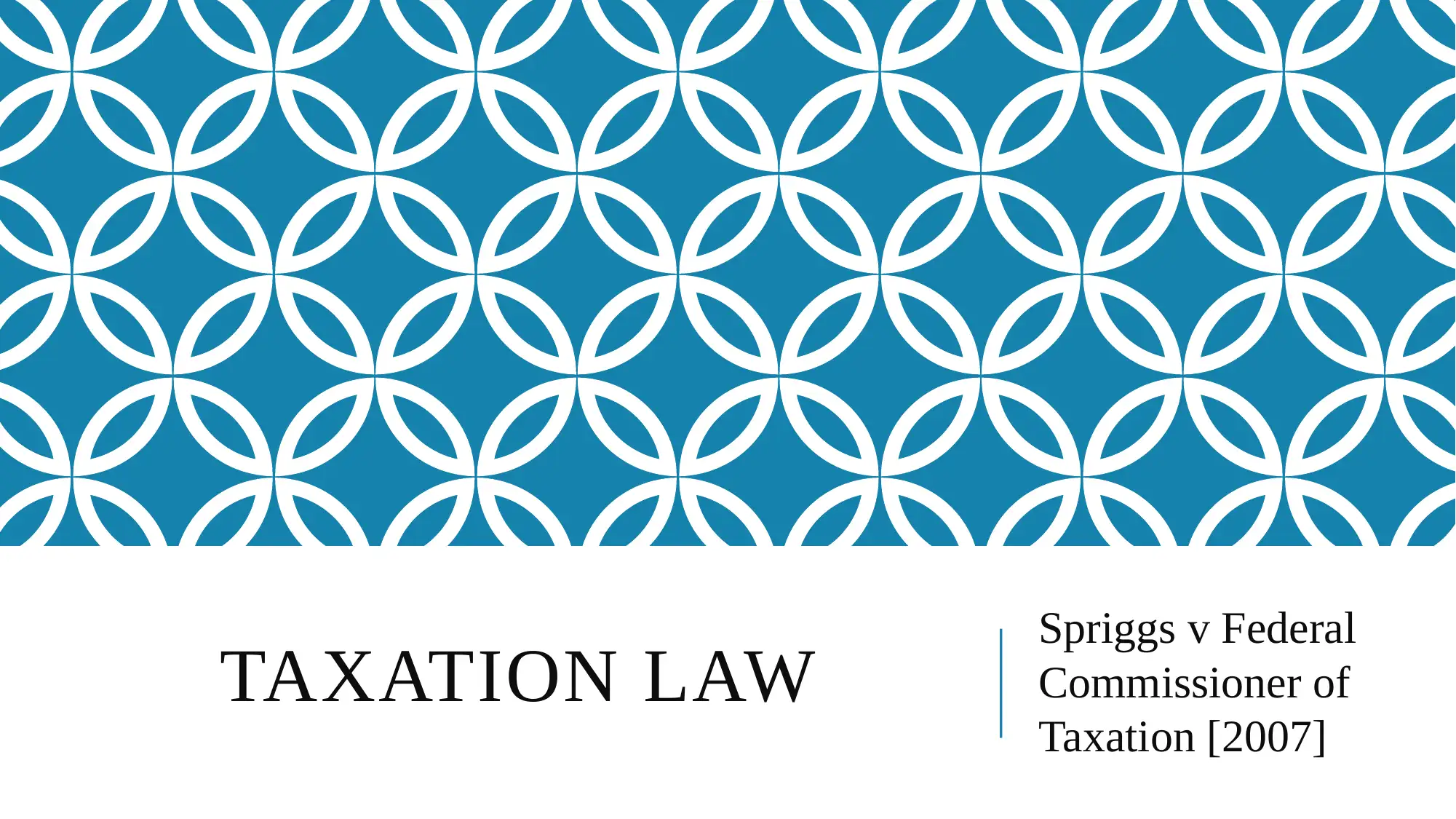
TAXATION LAW Spriggs v Federal
Commissioner of
Taxation [2007]
Commissioner of
Taxation [2007]
Paraphrase This Document
Need a fresh take? Get an instant paraphrase of this document with our AI Paraphraser
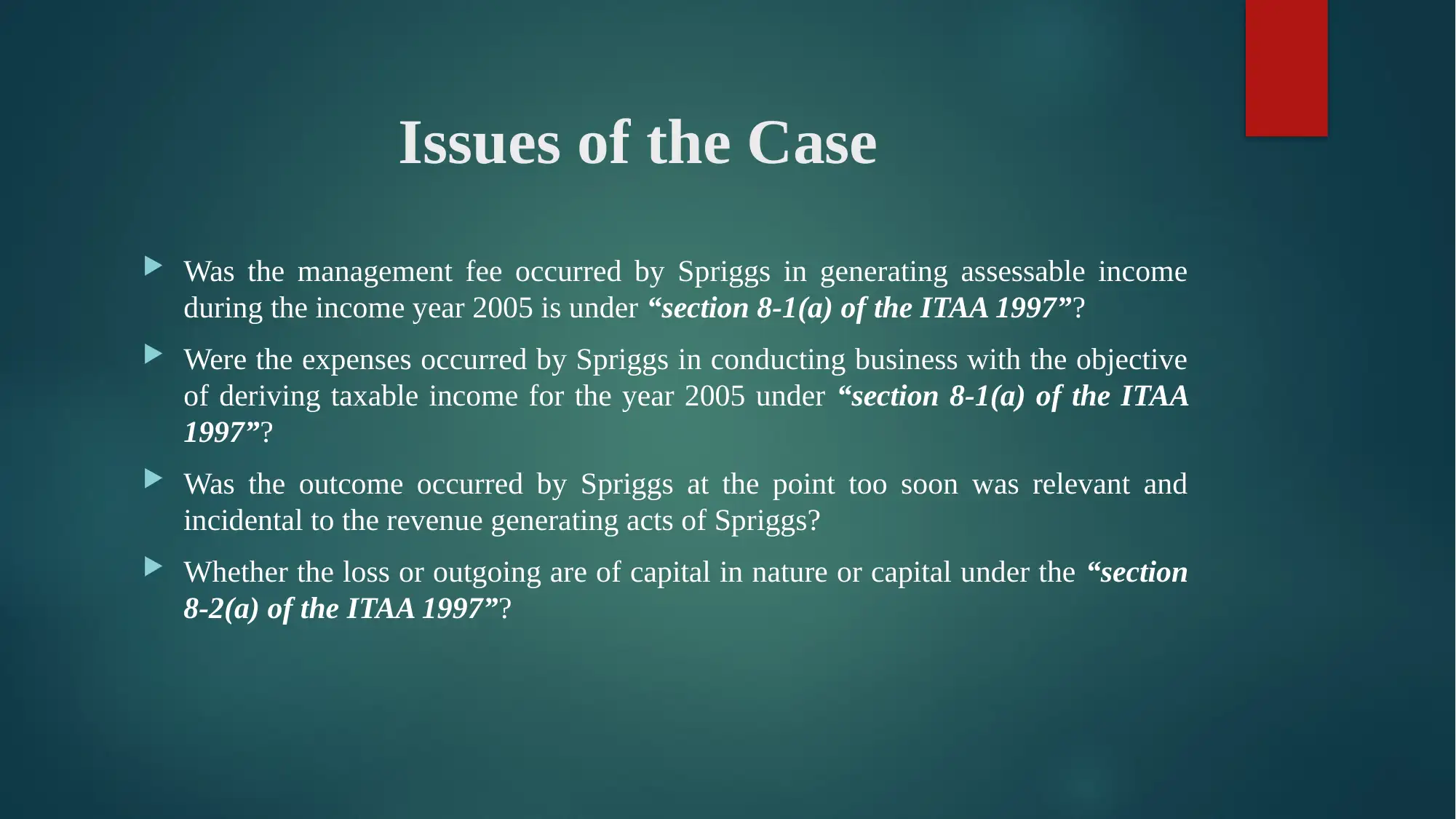
Issues of the Case
Was the management fee occurred by Spriggs in generating assessable income
during the income year 2005 is under “section 8-1(a) of the ITAA 1997”?
Were the expenses occurred by Spriggs in conducting business with the objective
of deriving taxable income for the year 2005 under “section 8-1(a) of the ITAA
1997”?
Was the outcome occurred by Spriggs at the point too soon was relevant and
incidental to the revenue generating acts of Spriggs?
Whether the loss or outgoing are of capital in nature or capital under the “section
8-2(a) of the ITAA 1997”?
Was the management fee occurred by Spriggs in generating assessable income
during the income year 2005 is under “section 8-1(a) of the ITAA 1997”?
Were the expenses occurred by Spriggs in conducting business with the objective
of deriving taxable income for the year 2005 under “section 8-1(a) of the ITAA
1997”?
Was the outcome occurred by Spriggs at the point too soon was relevant and
incidental to the revenue generating acts of Spriggs?
Whether the loss or outgoing are of capital in nature or capital under the “section
8-2(a) of the ITAA 1997”?
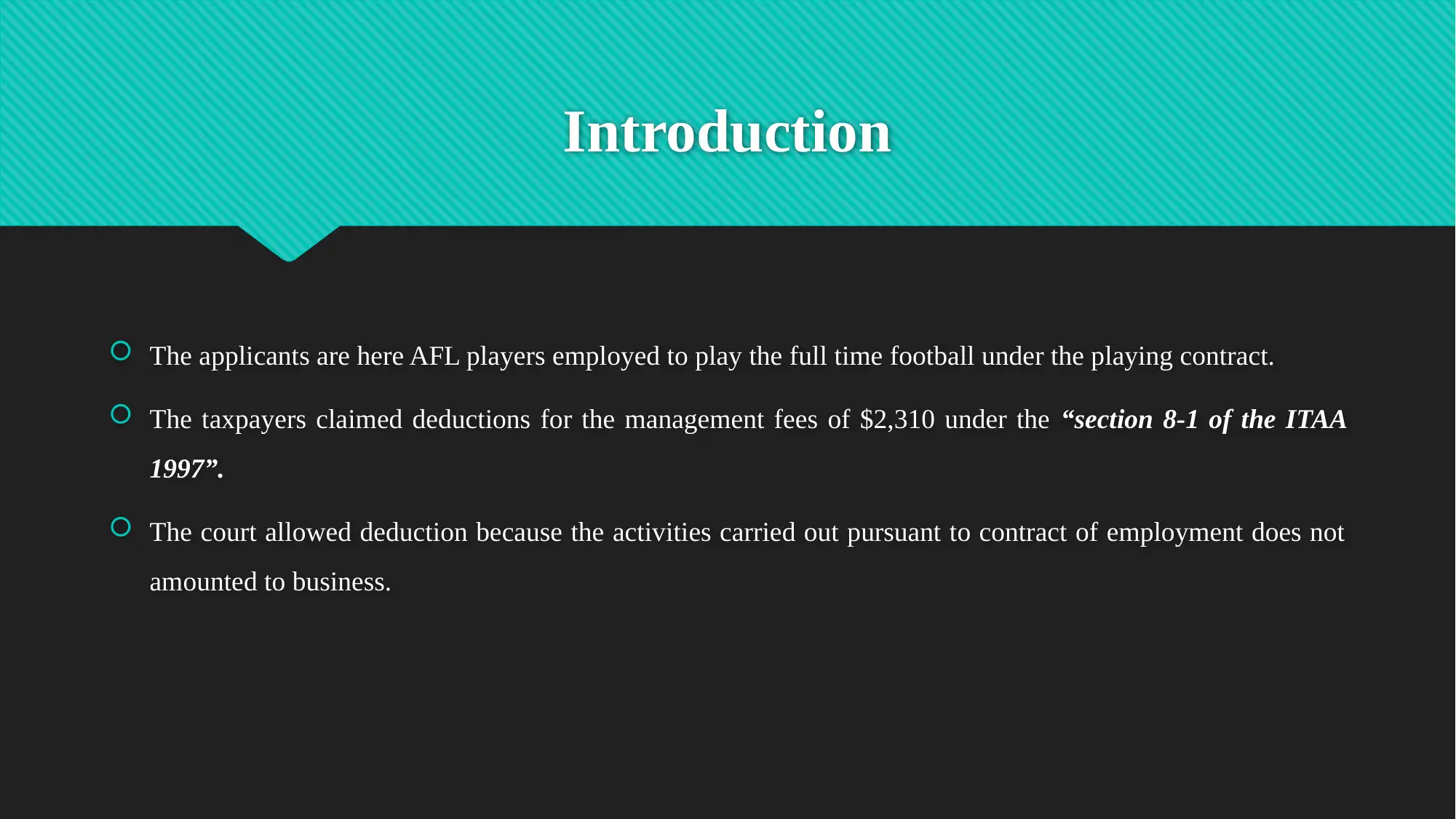
Introduction
The applicants are here AFL players employed to play the full time football under the playing contract.
The taxpayers claimed deductions for the management fees of $2,310 under the “section 8-1 of the ITAA
1997”.
The court allowed deduction because the activities carried out pursuant to contract of employment does not
amounted to business.
The applicants are here AFL players employed to play the full time football under the playing contract.
The taxpayers claimed deductions for the management fees of $2,310 under the “section 8-1 of the ITAA
1997”.
The court allowed deduction because the activities carried out pursuant to contract of employment does not
amounted to business.
⊘ This is a preview!⊘
Do you want full access?
Subscribe today to unlock all pages.

Trusted by 1+ million students worldwide
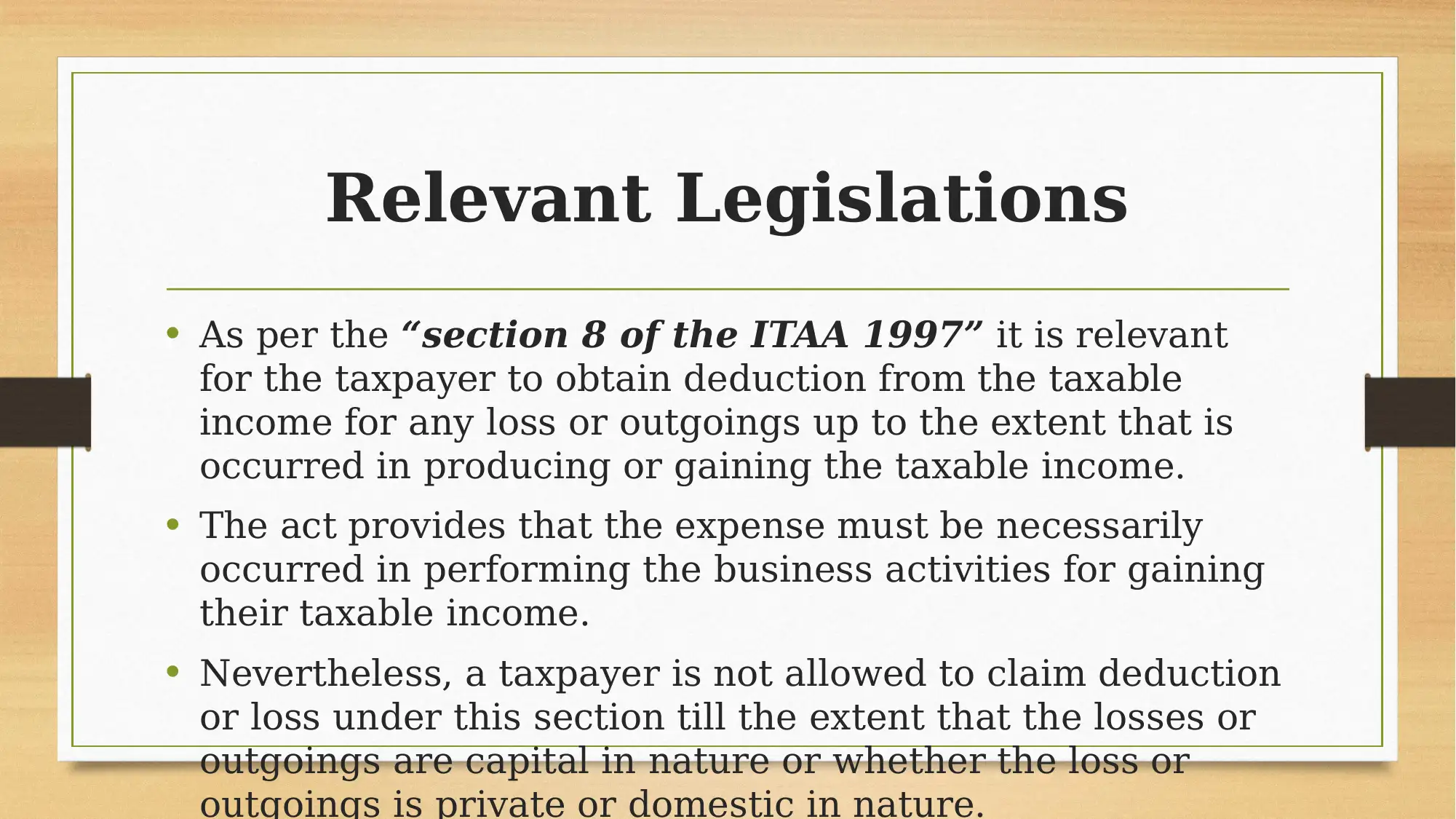
Relevant Legislations
• As per the “section 8 of the ITAA 1997” it is relevant
for the taxpayer to obtain deduction from the taxable
income for any loss or outgoings up to the extent that is
occurred in producing or gaining the taxable income.
• The act provides that the expense must be necessarily
occurred in performing the business activities for gaining
their taxable income.
• Nevertheless, a taxpayer is not allowed to claim deduction
or loss under this section till the extent that the losses or
outgoings are capital in nature or whether the loss or
outgoings is private or domestic in nature.
• As per the “section 8 of the ITAA 1997” it is relevant
for the taxpayer to obtain deduction from the taxable
income for any loss or outgoings up to the extent that is
occurred in producing or gaining the taxable income.
• The act provides that the expense must be necessarily
occurred in performing the business activities for gaining
their taxable income.
• Nevertheless, a taxpayer is not allowed to claim deduction
or loss under this section till the extent that the losses or
outgoings are capital in nature or whether the loss or
outgoings is private or domestic in nature.
Paraphrase This Document
Need a fresh take? Get an instant paraphrase of this document with our AI Paraphraser
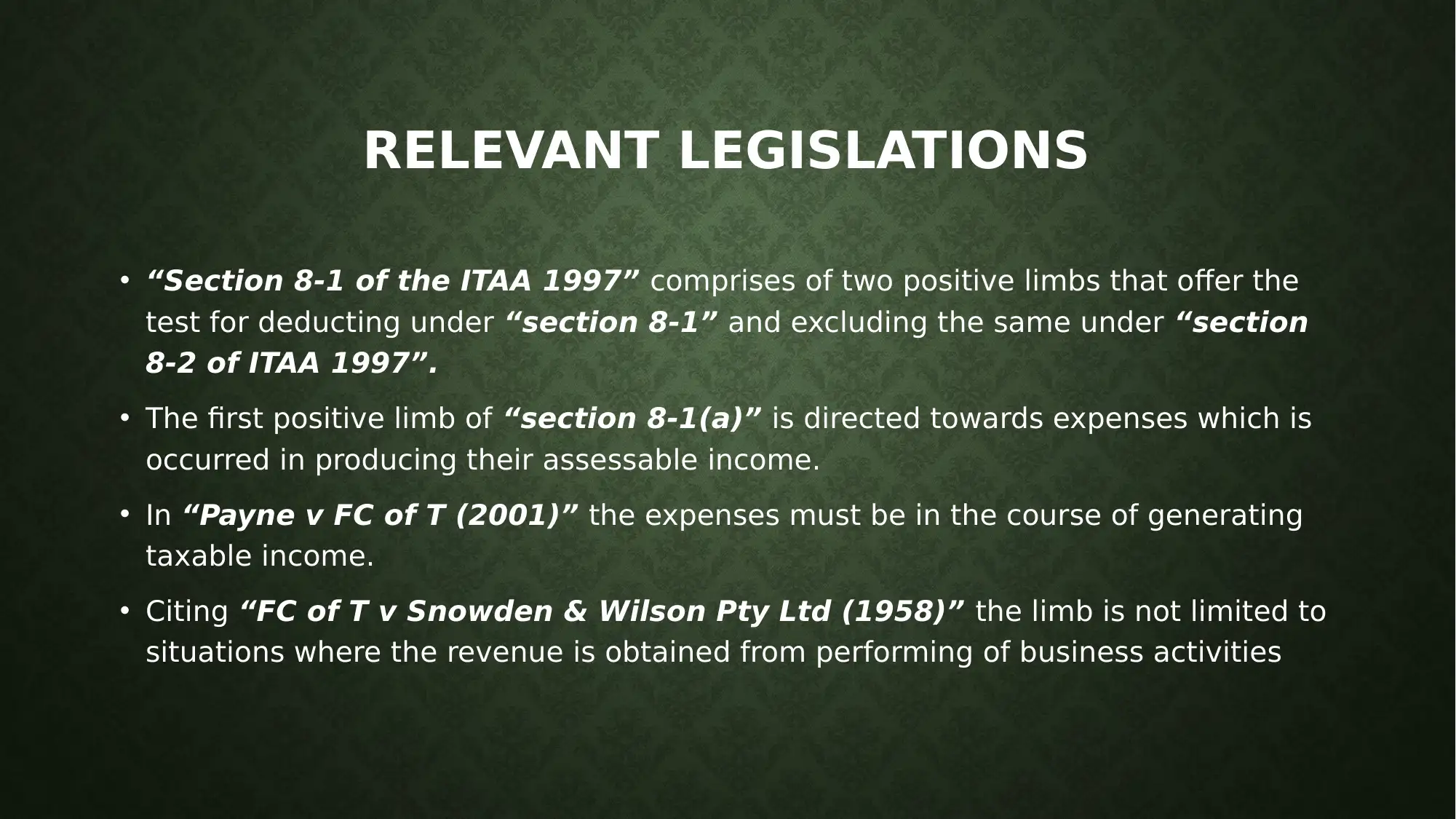
RELEVANT LEGISLATIONS
• “Section 8-1 of the ITAA 1997” comprises of two positive limbs that offer the
test for deducting under “section 8-1” and excluding the same under “section
8-2 of ITAA 1997”.
• The first positive limb of “section 8-1(a)” is directed towards expenses which is
occurred in producing their assessable income.
• In “Payne v FC of T (2001)” the expenses must be in the course of generating
taxable income.
• Citing “FC of T v Snowden & Wilson Pty Ltd (1958)” the limb is not limited to
situations where the revenue is obtained from performing of business activities
• “Section 8-1 of the ITAA 1997” comprises of two positive limbs that offer the
test for deducting under “section 8-1” and excluding the same under “section
8-2 of ITAA 1997”.
• The first positive limb of “section 8-1(a)” is directed towards expenses which is
occurred in producing their assessable income.
• In “Payne v FC of T (2001)” the expenses must be in the course of generating
taxable income.
• Citing “FC of T v Snowden & Wilson Pty Ltd (1958)” the limb is not limited to
situations where the revenue is obtained from performing of business activities
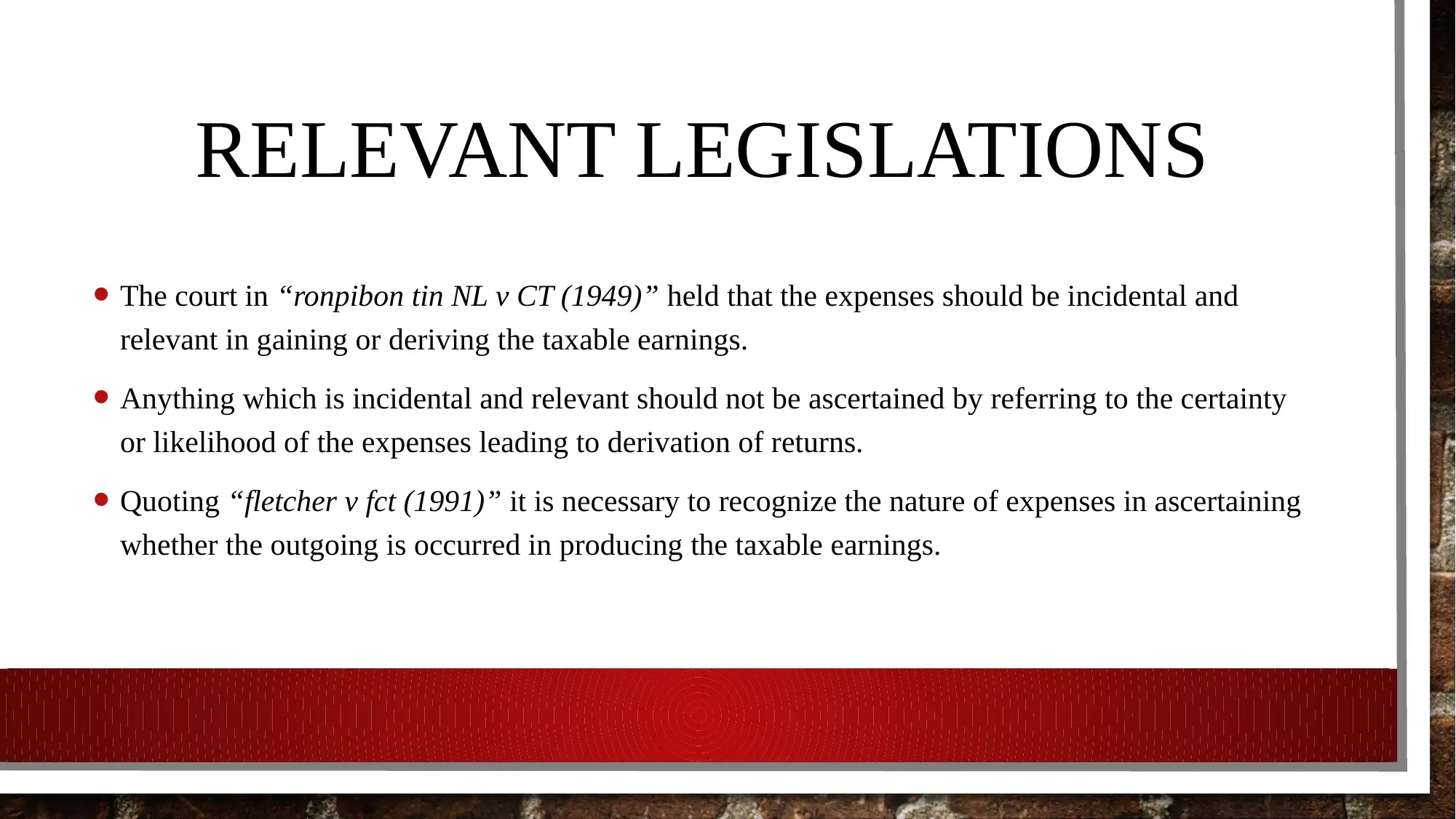
RELEVANT LEGISLATIONS
• The court in “ronpibon tin NL v CT (1949)” held that the expenses should be incidental and
relevant in gaining or deriving the taxable earnings.
• Anything which is incidental and relevant should not be ascertained by referring to the certainty
or likelihood of the expenses leading to derivation of returns.
• Quoting “fletcher v fct (1991)” it is necessary to recognize the nature of expenses in ascertaining
whether the outgoing is occurred in producing the taxable earnings.
• The court in “ronpibon tin NL v CT (1949)” held that the expenses should be incidental and
relevant in gaining or deriving the taxable earnings.
• Anything which is incidental and relevant should not be ascertained by referring to the certainty
or likelihood of the expenses leading to derivation of returns.
• Quoting “fletcher v fct (1991)” it is necessary to recognize the nature of expenses in ascertaining
whether the outgoing is occurred in producing the taxable earnings.
⊘ This is a preview!⊘
Do you want full access?
Subscribe today to unlock all pages.

Trusted by 1+ million students worldwide
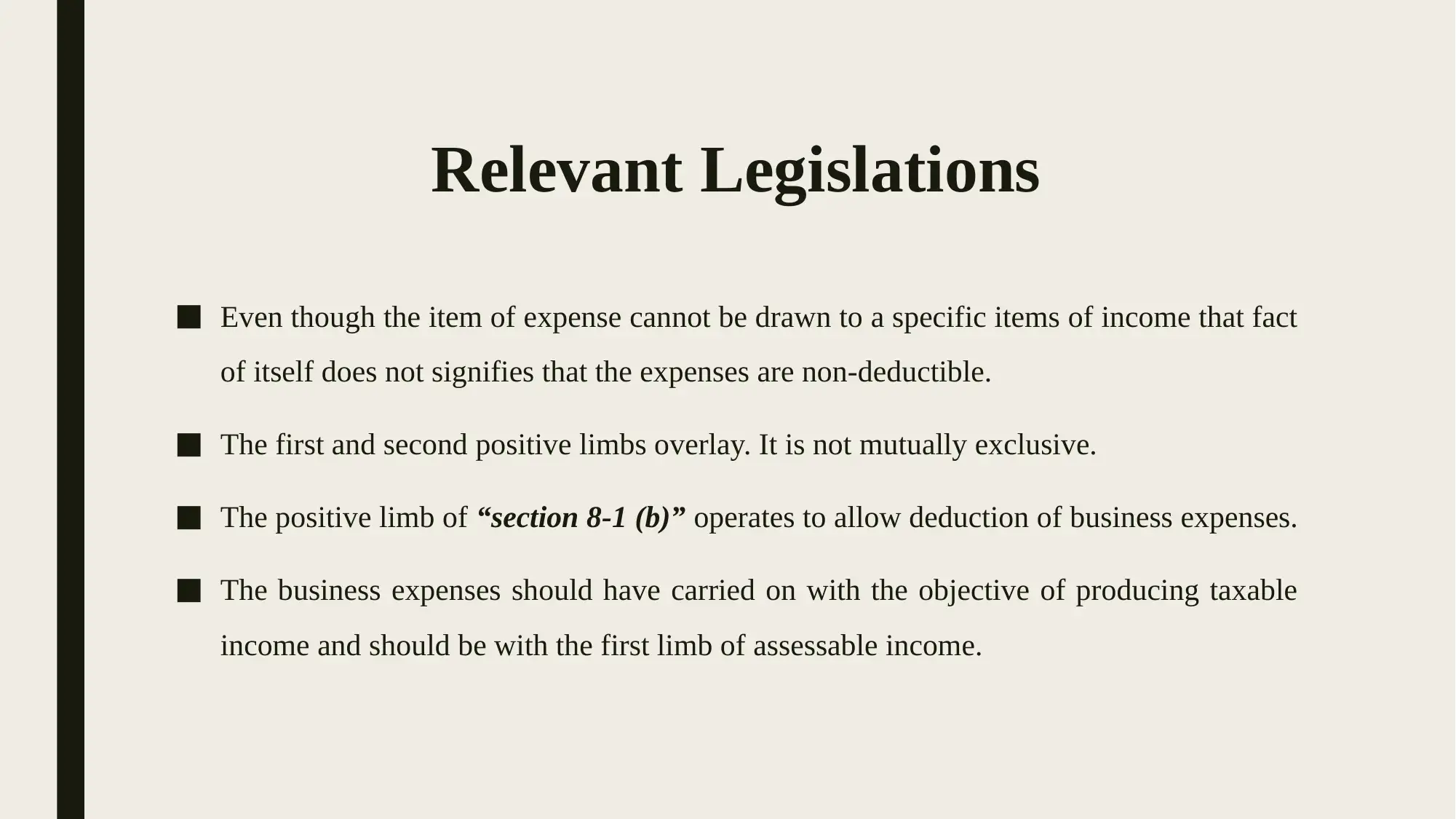
Relevant Legislations
■ Even though the item of expense cannot be drawn to a specific items of income that fact
of itself does not signifies that the expenses are non-deductible.
■ The first and second positive limbs overlay. It is not mutually exclusive.
■ The positive limb of “section 8-1 (b)” operates to allow deduction of business expenses.
■ The business expenses should have carried on with the objective of producing taxable
income and should be with the first limb of assessable income.
■ Even though the item of expense cannot be drawn to a specific items of income that fact
of itself does not signifies that the expenses are non-deductible.
■ The first and second positive limbs overlay. It is not mutually exclusive.
■ The positive limb of “section 8-1 (b)” operates to allow deduction of business expenses.
■ The business expenses should have carried on with the objective of producing taxable
income and should be with the first limb of assessable income.
Paraphrase This Document
Need a fresh take? Get an instant paraphrase of this document with our AI Paraphraser
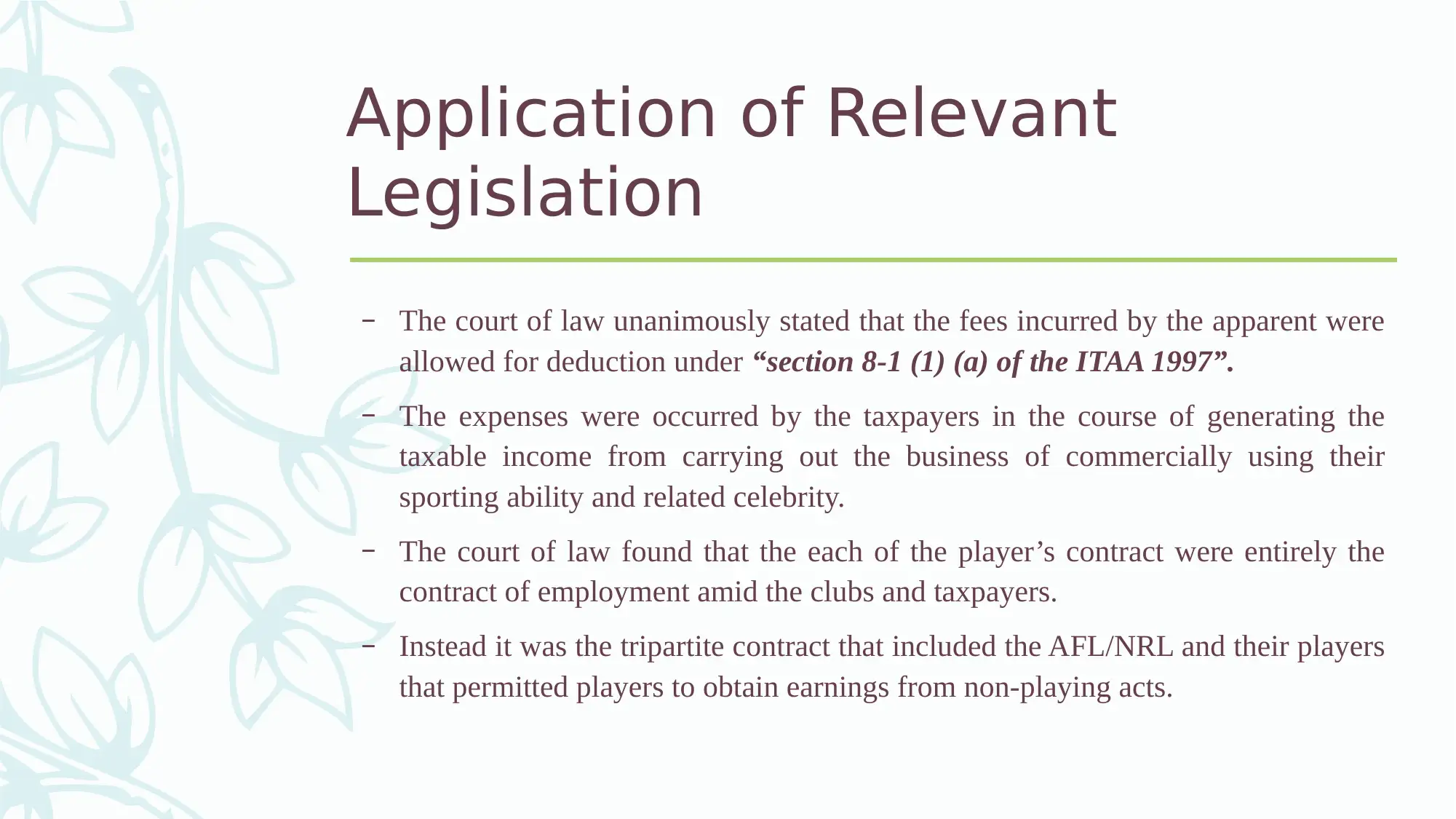
Application of Relevant
Legislation
– The court of law unanimously stated that the fees incurred by the apparent were
allowed for deduction under “section 8-1 (1) (a) of the ITAA 1997”.
– The expenses were occurred by the taxpayers in the course of generating the
taxable income from carrying out the business of commercially using their
sporting ability and related celebrity.
– The court of law found that the each of the player’s contract were entirely the
contract of employment amid the clubs and taxpayers.
– Instead it was the tripartite contract that included the AFL/NRL and their players
that permitted players to obtain earnings from non-playing acts.
Legislation
– The court of law unanimously stated that the fees incurred by the apparent were
allowed for deduction under “section 8-1 (1) (a) of the ITAA 1997”.
– The expenses were occurred by the taxpayers in the course of generating the
taxable income from carrying out the business of commercially using their
sporting ability and related celebrity.
– The court of law found that the each of the player’s contract were entirely the
contract of employment amid the clubs and taxpayers.
– Instead it was the tripartite contract that included the AFL/NRL and their players
that permitted players to obtain earnings from non-playing acts.
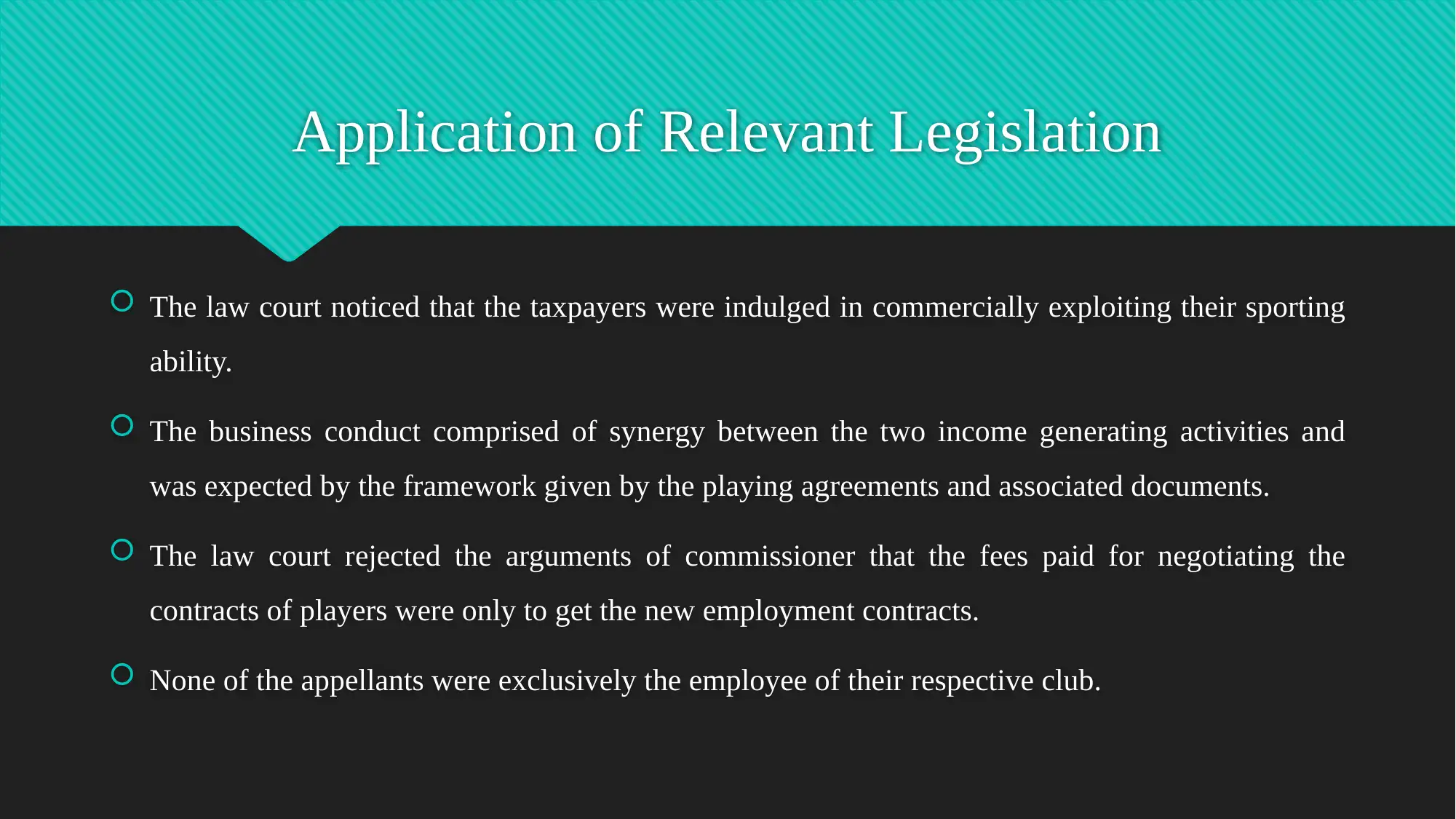
Application of Relevant Legislation
The law court noticed that the taxpayers were indulged in commercially exploiting their sporting
ability.
The business conduct comprised of synergy between the two income generating activities and
was expected by the framework given by the playing agreements and associated documents.
The law court rejected the arguments of commissioner that the fees paid for negotiating the
contracts of players were only to get the new employment contracts.
None of the appellants were exclusively the employee of their respective club.
The law court noticed that the taxpayers were indulged in commercially exploiting their sporting
ability.
The business conduct comprised of synergy between the two income generating activities and
was expected by the framework given by the playing agreements and associated documents.
The law court rejected the arguments of commissioner that the fees paid for negotiating the
contracts of players were only to get the new employment contracts.
None of the appellants were exclusively the employee of their respective club.
⊘ This is a preview!⊘
Do you want full access?
Subscribe today to unlock all pages.

Trusted by 1+ million students worldwide
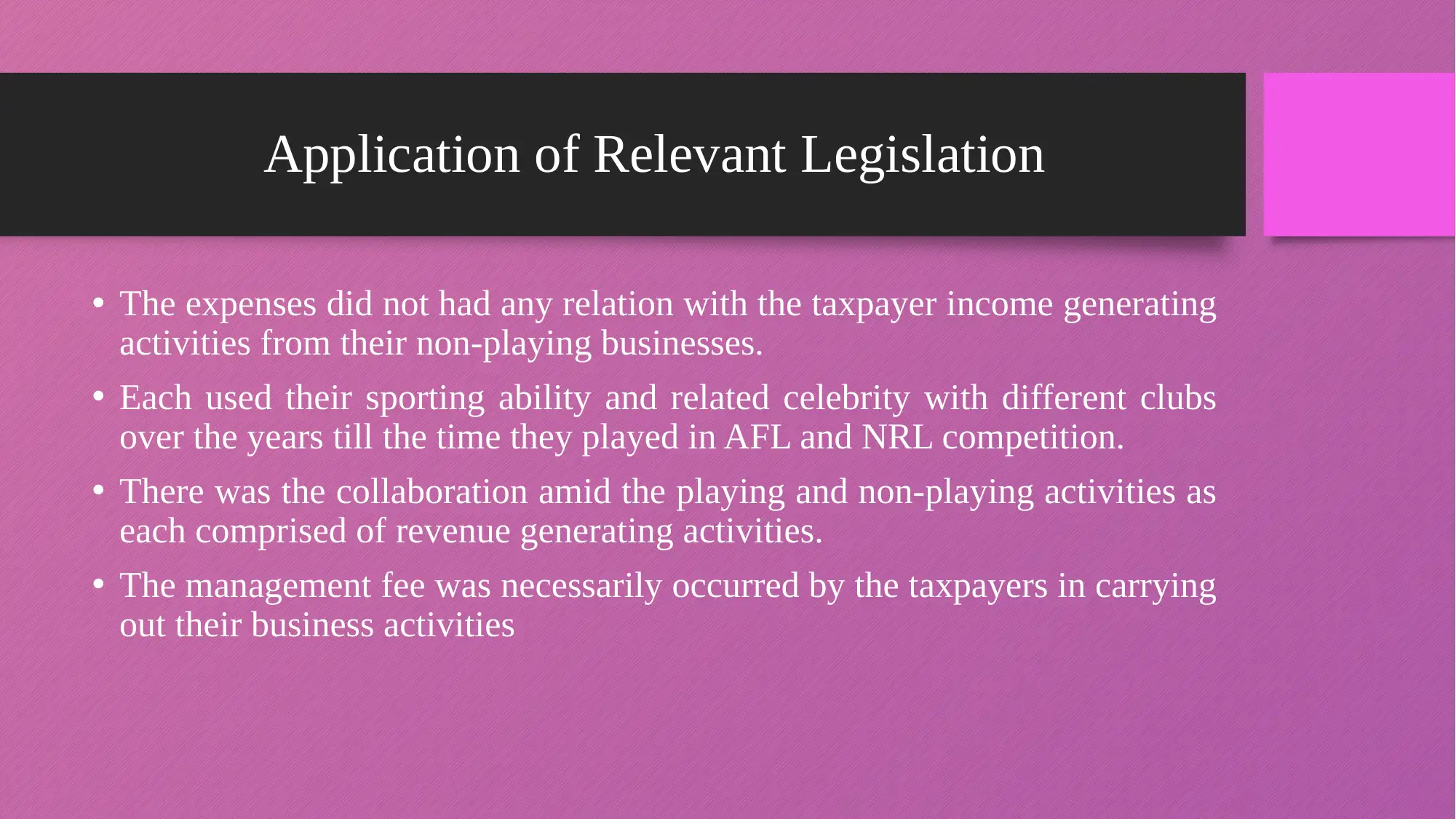
Application of Relevant Legislation
• The expenses did not had any relation with the taxpayer income generating
activities from their non-playing businesses.
• Each used their sporting ability and related celebrity with different clubs
over the years till the time they played in AFL and NRL competition.
• There was the collaboration amid the playing and non-playing activities as
each comprised of revenue generating activities.
• The management fee was necessarily occurred by the taxpayers in carrying
out their business activities
• The expenses did not had any relation with the taxpayer income generating
activities from their non-playing businesses.
• Each used their sporting ability and related celebrity with different clubs
over the years till the time they played in AFL and NRL competition.
• There was the collaboration amid the playing and non-playing activities as
each comprised of revenue generating activities.
• The management fee was necessarily occurred by the taxpayers in carrying
out their business activities
Paraphrase This Document
Need a fresh take? Get an instant paraphrase of this document with our AI Paraphraser
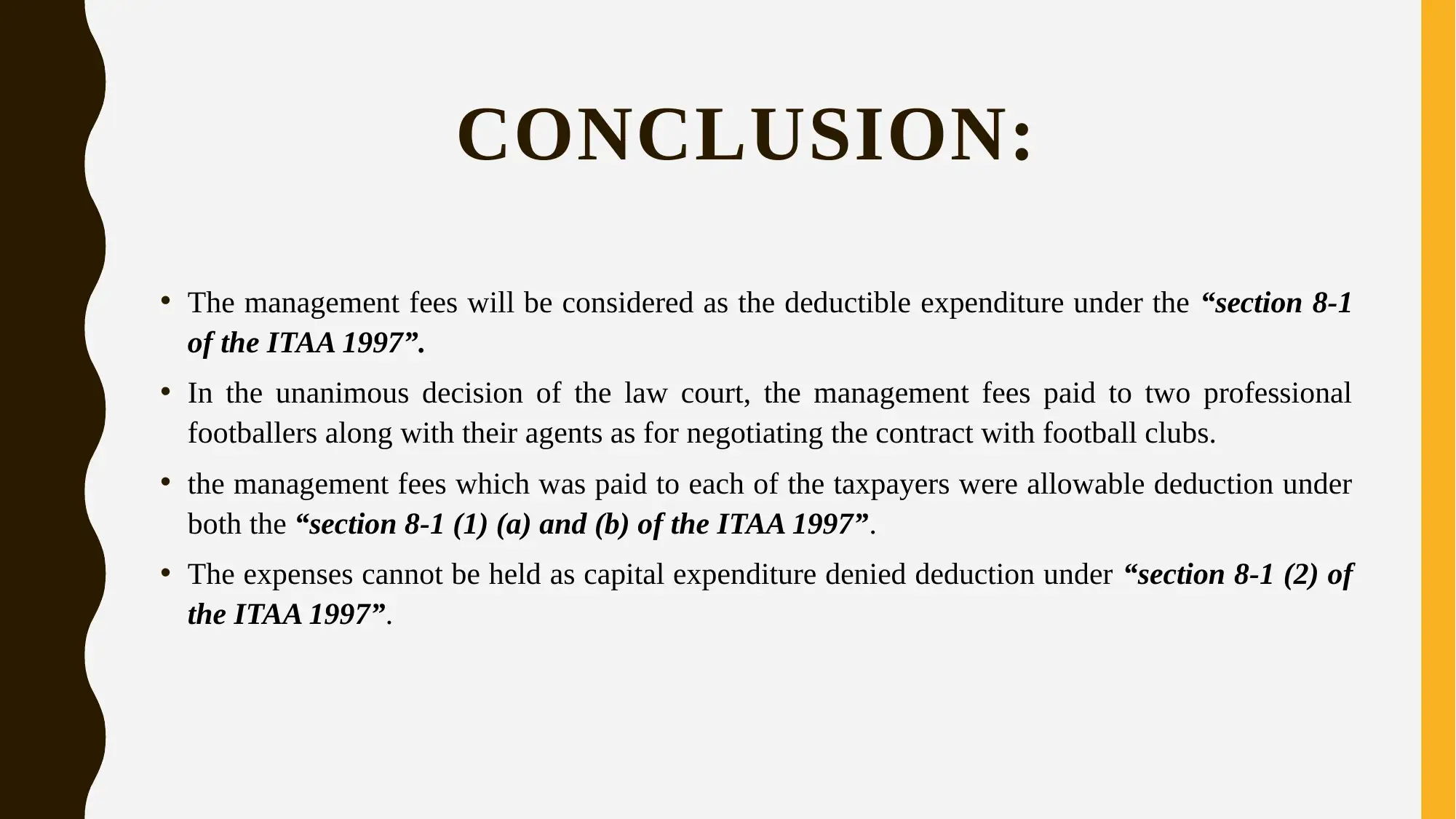
CONCLUSION:
• The management fees will be considered as the deductible expenditure under the “section 8-1
of the ITAA 1997”.
• In the unanimous decision of the law court, the management fees paid to two professional
footballers along with their agents as for negotiating the contract with football clubs.
• the management fees which was paid to each of the taxpayers were allowable deduction under
both the “section 8-1 (1) (a) and (b) of the ITAA 1997”.
• The expenses cannot be held as capital expenditure denied deduction under “section 8-1 (2) of
the ITAA 1997”.
• The management fees will be considered as the deductible expenditure under the “section 8-1
of the ITAA 1997”.
• In the unanimous decision of the law court, the management fees paid to two professional
footballers along with their agents as for negotiating the contract with football clubs.
• the management fees which was paid to each of the taxpayers were allowable deduction under
both the “section 8-1 (1) (a) and (b) of the ITAA 1997”.
• The expenses cannot be held as capital expenditure denied deduction under “section 8-1 (2) of
the ITAA 1997”.

Thank You
⊘ This is a preview!⊘
Do you want full access?
Subscribe today to unlock all pages.

Trusted by 1+ million students worldwide
1 out of 12
Related Documents
Your All-in-One AI-Powered Toolkit for Academic Success.
+13062052269
info@desklib.com
Available 24*7 on WhatsApp / Email
![[object Object]](/_next/static/media/star-bottom.7253800d.svg)
Unlock your academic potential
Copyright © 2020–2026 A2Z Services. All Rights Reserved. Developed and managed by ZUCOL.
![Taxation Law: Spriggs v Federal Commissioner of Taxation [2007]](/_next/image/?url=https%3A%2F%2Fdesklib.com%2Fmedia%2Fdocument%2Fpages%2Fspriggs-taxation-law-case-page-2.jpg&w=256&q=75)




